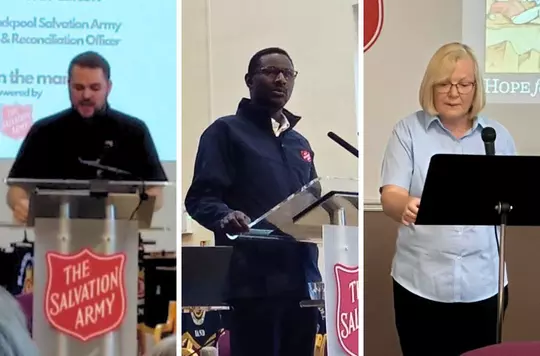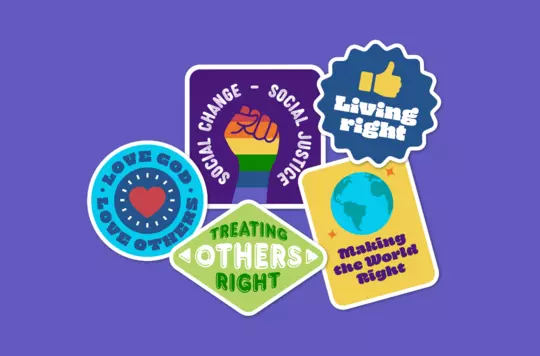23 November 2024
Luke 14: Passion for inclusion
Captain John Clifton
Territorial Justice and Reconciliation Officer Captain John Clifton reminds us of the Army’s calling to the marginalised.
Key text
The parable of the great banquet offers a lesson about Jesus’ vision of inclusion. Initially, a select group receives the invitation but, after they decline, the invitation is extended to a far wider audience – including those on the margins of society. This reflects the ultimate offer of God’s grace, which is available to all. However, not everyone chooses to accept this grace. As we explore this passage, we see both the expansiveness of God’s invitation and the personal choice involved in responding to it.
Pause and reflect
- Who today might not be accepting God’s grace?
- As individuals and as a church, how can we respond to ensure the invitation is open and accessible?
In the ancient world, meals were significant markers of status and power. Who you ate with mattered. It reflected your societal standing. In verses 12 to 14, Jesus inverts social expectations. By suggesting that the host should invite those who could never repay – ‘the poor, the crippled, the lame, the blind’ (v13) – Jesus challenges not just social norms but also spiritual perceptions. He hints at a broader truth: the Kingdom of God isn’t based on merit but on God’s abundant grace. The emphasis here is on grace extended to the ‘least of these’ (Matthew 25:40), reflecting God’s inclusion of the marginalised.
Luke’s Gospel frequently emphasises this reversal of worldly values – the first shall be last, the exalted shall be humbled. Jesus’ instructions foreshadow the open invitation of the banquet. The challenge for us is to examine how we extend grace in our lives.
Pause and reflect
- Who in your community might be overlooked or excluded?
- How can you model God’s heart by extending grace to those on the margins?
In verses 16 to 20, the initial invitees to the banquet offer excuses: one has bought land, another oxen and a third is recently married. While these are not inherently sinful excuses, they reflect misplaced priorities – choosing personal concerns over the master’s invitation. This shows how easily we can be distracted by life’s demands. If our priorities are not aligned with his Kingdom, we can miss God’s invitation.
Often, we are distracted by subtle sin and seemingly legitimate concerns – work, relationships, possessions. In the parable, these distractions prevent the invitees from receiving the blessings of the banquet.
For Luke’s audience – and for us today – the parable warns us to consider what we are prioritising over our response to God. Are we self-excluding by allowing everyday concerns to cloud our vision of his Kingdom?
Pause and reflect
- What distractions might cause people to miss God’s invitation?
- In what areas of your life do you need to allow God’s grace to transform you?
In verses 21 to 24, the invitation is extended to those on the margins – ‘the poor, the crippled, the blind and the lame’ (v21). This reflects God’s inclusive nature and how his grace reaches those most often excluded by society. Even after inviting the marginalised, the master sends his servants out further, ‘to the roads and country lanes’ (v23), compelling others to come. This reflects the relentless pursuit of God’s grace: he will continue inviting until everyone has had the chance to respond.
This is a vision of God’s Kingdom that transcends all social boundaries. This inclusivity is not merely an open-door policy; it is an active pursuit. God’s invitation reaches those on the fringes of society, both socially and spiritually. For The Salvation Army, this speaks directly to our mission. We have a permanent calling to the unsaved and the marginalised. We are called not only to extend an invitation but also to go out and compel – engaging, walking alongside and inviting others into God’s grace.
Pause and reflect
- Who might feel excluded from God’s invitation today?
- Who might feel excluded from church communities today?
- How can the Army live out its mission to the unsaved and the marginalised, ensuring the gospel invitation remains accessible?
Accepting this invitation, however, also comes with an important implication – it requires a willingness to be changed. Those who come to the banquet are invited as they are. However, they do not remain unchanged. Accepting the invitation means allowing God’s grace to reshape our lives.
The banquet is not just a free meal; it symbolises participation in the Kingdom of God. To accept God’s invitation is to enter into a transformative relationship with him. It implies a willingness to leave behind the distractions and priorities that kept us away in the first place. As Jesus extends his invitation, he calls for a change of heart – a reordering of life’s values, so that God’s Kingdom comes first.
Pause and reflect
- In what areas of your life might you need to allow God’s grace to transform you?
- How can you help others understand that accepting God’s invitation means embracing his transformative power?
The parable of the great banquet offers us a deep understanding of God’s invitation – broad, inclusive and transformative. God invites all to his table, but he also calls us to respond. Jesus’ inclusion is not passive; it requires both extending the invitation and embracing the change that comes with responding to God’s grace.
As The Salvation Army, we are called to live out this vision – bringing the message of grace to the unsaved and the marginalised and walking alongside those who accept it as they experience God’s transforming power. May we reflect God’s generous invitation and his transformative grace as we live out our mission with passion and purpose.
Bible study by

Captain John Clifton
Corps Officer, Blackpool Citadel and Blackpool South
Discover more

Captain Chris Button (Stroud) reports on the inaugural Mission in the Margins Conference.

Justice and Reconciliation Officer Captain John Clifton unpacks the seek justice and reconciliation mission priority.

Territorial Leader Commissioner Paul Main challenges us to be defenders of justice in his Bible message for Commissioning recorded at Together 2024.

Empowering young people to improve the future by disturbing the present.
